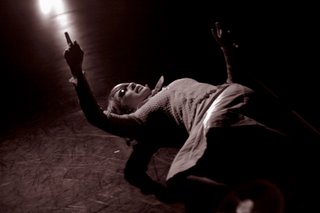For someone with so little control over that register, however, I've found over the years that other's voices really stick with me. I used to delude myself into thinking I had a good memory for names, and when that proved wrong I went for the obvious "faces" option, but really, it's turned out that I have no particular facility for remembering either. Voices, on the other hand, I do recall rather well. If I think of someone I once knew, I can always summon up their voice. Can everyone do this? I hope so. I can imagine that, in our visual/textual culture, when we think of another person we rarely do so by conjuring their sound. If you're like me, though, and find it pleasurable to drag a memory out of the old toybox and enjoy it for itself, passing it from hand to hand, feeling its weight and the way gravity pulls at it, you could do worse than trying this kind of recollection on the aural level. If you know me, try to recall my voice.
Two of the shows I've enjoyed most during this year's festival have been dependent on the power of one person's voice. They're vastly different pieces, but each offered a sole speaker throwing words into the void, hoping that they would find some purchase.

William Yang's Objects for Meditation sounds as dry as can be, on paper at least. One guy standing alone on a stage, talking for an hour and a half about, well, stuff, while twinned projector screens behind him are filled with photographic images illustrating said stuff. It works, though. Yang is a charming orator, speaking in a very emphatic, slow style, and taking us on an eclectic oral journey encompassing decades of his life, his travels, his sexuality, his family, his pseudo-Daoist philosophy and the relationships between all of these things. It's an artfully artless performance, seeming on the surface to consist of little more than the peripatetic ramblings of a worldly (and wordy) soul, but hinting at great correspondences between the various aspects of a person's existence. It's also a very humble work; describing his attraction towards water, he sums this up well. Water seeks out the lowest places, but it carves its way through mountains. Water's softness slowly defeats hardness.
There's a great deal to ponder over in the narration, and it's the kind of piece that slowly settles into your mind over a while, well after the show has ended. It kind of reminded me of W. G. Sebald's writing, which I've never felt I truly understood, but which nonetheless gets my mind going in all kinds of directions. Which, I suppose, is a kind of understanding in itself.
Yang's an engaging speaker, but not quite engrossing. Marie Brassard, on the other hand...

Brassard's Peepshow really is my festival pick for 2006. I didn't go in with particularly high expectations, since the idea of a solo show that boasts a performer whose voice is electronically altered screamed 1979 performance art nightmare. How wrong I was. Brassard is an actor who holds her audience in the palm of her hand, but uses that power conscientiously. She takes us to places we might not be comfortable with (and god knows, her climactic thigh-carving bit is an exercise in Deleuzian panic-button-pushing) but also offers a shag-pile carpet to fall back onto when all's said and done.
Well, all might be said, but it's never done; not if a show is worth it. Peepshow is worth it. If you only see one show this fest, make this the one. If not: sorry. Come back next week to read more.
No comments:
Post a Comment